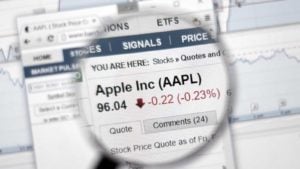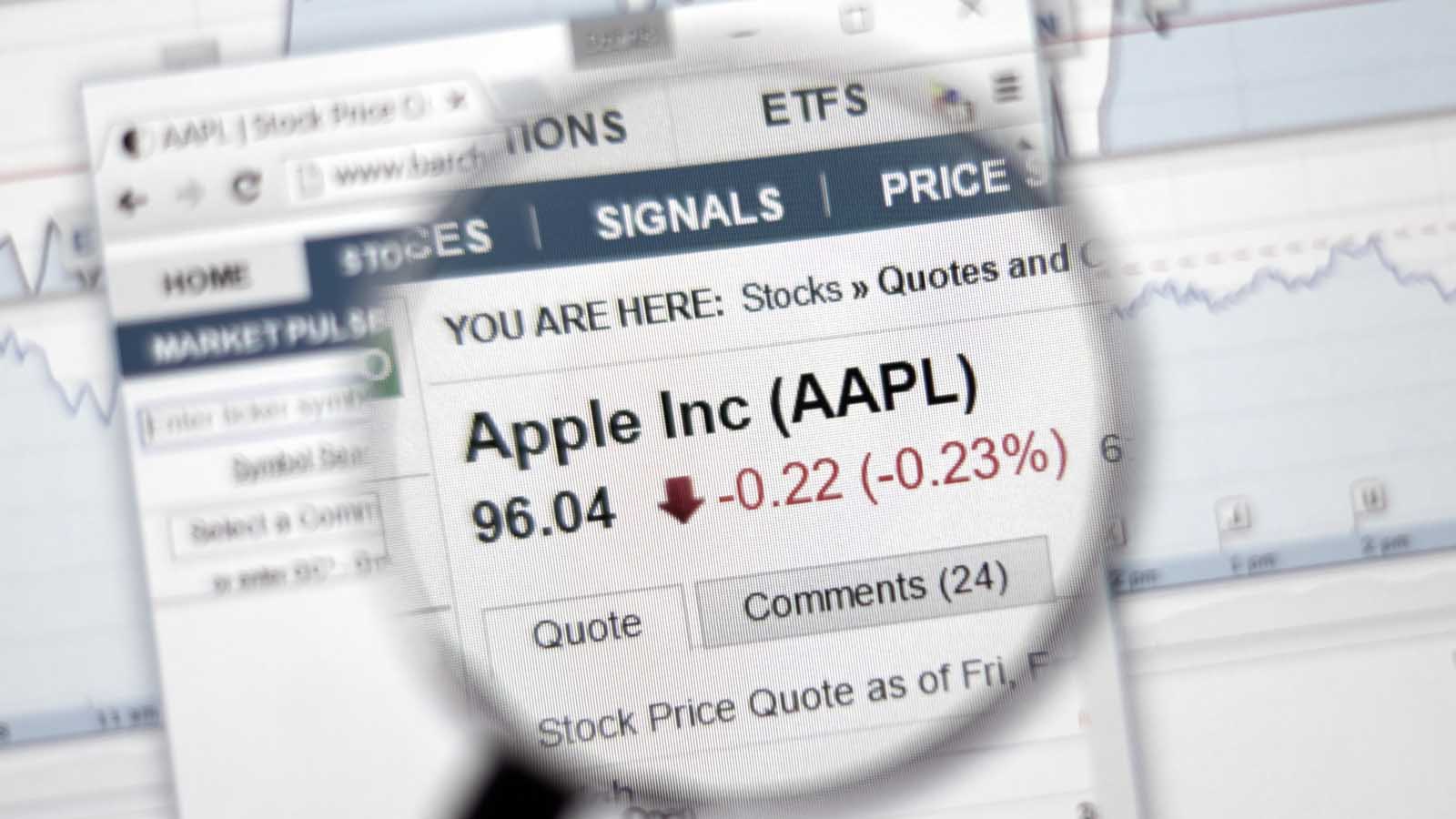After Apple (NASDAQ:AAPL) received a boost from the work-at-home trend in its quarter that ended in June, AAPL stock appears to have reverted to form last quarter, with one exception.

The company’s China business, in-line with my previous warnings, sharply contracted, indicating that the hardware giant could have a big, ongoing problem in the country.
And while Apple’s recent launch of a 5G iPhone could conceivably prevent AAPL stock from retreating further, there are multiple signs that this widely-expected scenario will actually not materialize.
When I say that Apple’s Q4 results, reported on Oct. 29, reverted to form, I mean that the company’s top line rose just 1% year-over-year, while its operating income dropped slightly YOY.
Tiny YOY top-line gains and small YOY operating income declines have pretty much been “par for the course” for Apple in most quarters since the end of 2018.
Services Won’t Boost Apple Stock
Since it became clear in 2019 that Apple TV+ was not going to move the needle for the tech giant, Apple bulls have identified its Services and 5G as the two main positive catalysts for Apple stock.
For a long time, it’s been clear to me that Services won’t be a game changer for the company or the shares. Last quarter, the company’s Services revenue rose 16% YOY, in-line with the roughly 15%-18% gains that the company has usually reported in recent years.
But its Services sales still only rose by about $2 billion YOY, which amounted to roughly 4% of the company’s total Q4 revenue. Another InvestorPlace contributor, Ian Bezek, recently reported that the Services revenue beat analysts’ average outlook by $380 million.
That $380 million works out to 0.75% of the company’s Q4 revenue. I think it’s clear that, barring some sort of huge, unlikely breakthrough, Services alone are not going to keep Apple stock trading at its current high valuation.
5G Is the Last Hope For AAPL Stock
Bulls blamed the company’s weak (but normal) results on consumers deciding not to buy its iPhones last quarter because they were waiting for its 5G-enabled smartphones, which were launched earlier this month.
Indeed, Apple’s iPhone sales dropped 3% YOY last quarter after tumbling 14% YOY in fiscal Q4 of 2019.
But other factors may have played a role in the decline, including two issues I’ve identified previously: falling demand for iPhones due to macroeconomic issues and anti-American sentiment (and, by extension, anti-Apple sentiment) in China.
The fact that Apple’s Greater China revenue tumbled 28% YOY last quarter suggests that the latter factor was indeed meaningful.
Going forward, Apple’s work-from-home bump is likely to fade after a vaccine for the novel coronavirus is launched and therapeutics for the disease continue to improve.
And, as I discussed earlier, Services aren’t going to move the needle, while the company seems to be facing a significant challenge in China. Finally, I don’t see any evidence that the company has taken the steps that I believe is necessary to trigger an Apple Watch supercycle.
Consequently, unless the company gets a huge boost from its 5G iPhones, this year’s 50% gain by AAPL stock will have been way overdone and the shares are likely to retreat significantly.
Signs That the 5G Bump May Not Be Huge
There are multiple signs that the Apple bulls’ latest prediction — an iPhone “supercycle” following the launch of the new iPhones- may be as wrong as their previous ideas about the impact of Apple TV Plus and the company’s Services.
First, many publications, including Barron’s, have recently reported that consumers are likely to be largely disappointed by the impact of 5G on their phones.
Barron’s even wrote earlier this month that “5G won’t matter that much,” except ” in places where large groups congregate, including business districts, stadiums, and campuses.”
If 5G doesn’t make much of an impact on smartphones in most situations, it’s difficult to see how the new technology will trigger an “iPhone supercycle.”
Meanwhile, citing the potential impact of the pandemic, Apple declined to provide any guidance for its current quarter. But many other tech companies have offered guidance this quarter. As a result, Apple’s reluctance to do so could be a sign that the supercycle isn’t materializing.
Finally, Apple’s CEO, Tim Cook, its COO, Jeffrey Williams, and its CFO, Luca Maestri, have sold a great deal of AAPL stock in recent months, perhaps indicating that they do not have much confidence in the supercycle theory. In August 2020, Cook sold a total of 561,000 shares.
While he unloaded about the same amount of shares in Aug. 2019, of course the shares he sold this year were much more valuable because the stock has surged about 70% over the last year.
If Cook thought a supercycle was coming, I believe that he likely would have sold many fewer shares in August 2020.
For his part, Maestri sold 275,000 shares on Oct. 1, versus the roughly 196,000 he unloaded during the same day in 2019. As for Williams, he divested over 500,000 shares, versus just roughly 257,000 on the same day a year earlier.
The Bottom Line on Apple Stock
Services, like Apple TV+ won’t move the needle, and multiple signs indicate that there will not be an iPhone supercycle. Meanwhile, macro trends in the U.S., China, and elsewhere appear to be going against the company. Given these points, Apple stock looks risky and I recommend selling the shares now.
On the date of publication, Larry Ramer did not have (either directly or indirectly) any positions in the securities mentioned in this article.
Larry has conducted research and written articles on U.S. stocks for 13 years. He has been employed by The Fly and Israel’s largest business newspaper, Globes. Among his highly successful contrarian picks have been solar stocks, Roku, Plug Power, and Snap. You can reach him on StockTwits at @larryramer. Larry began writing columns for InvestorPlace in 2015.
